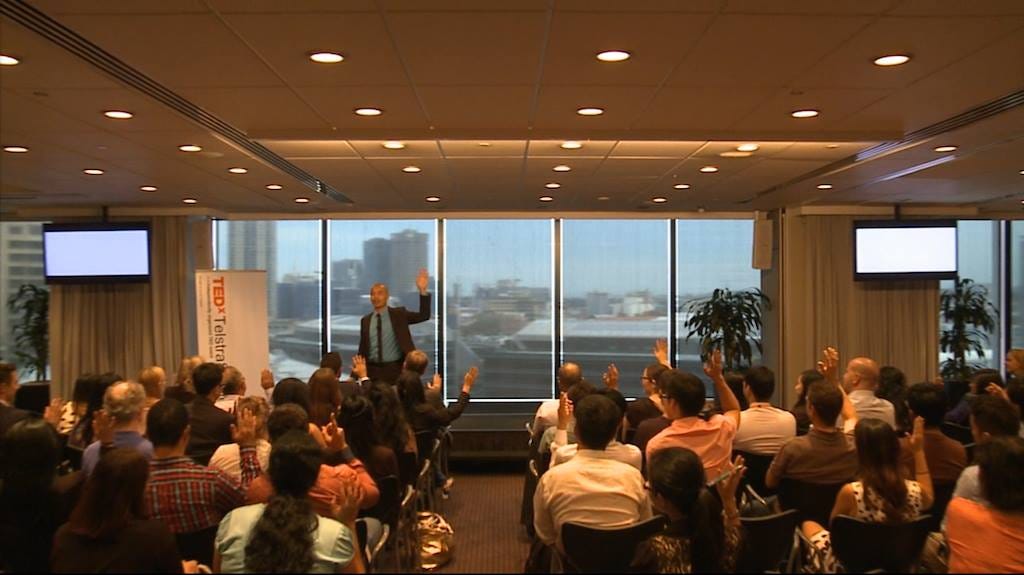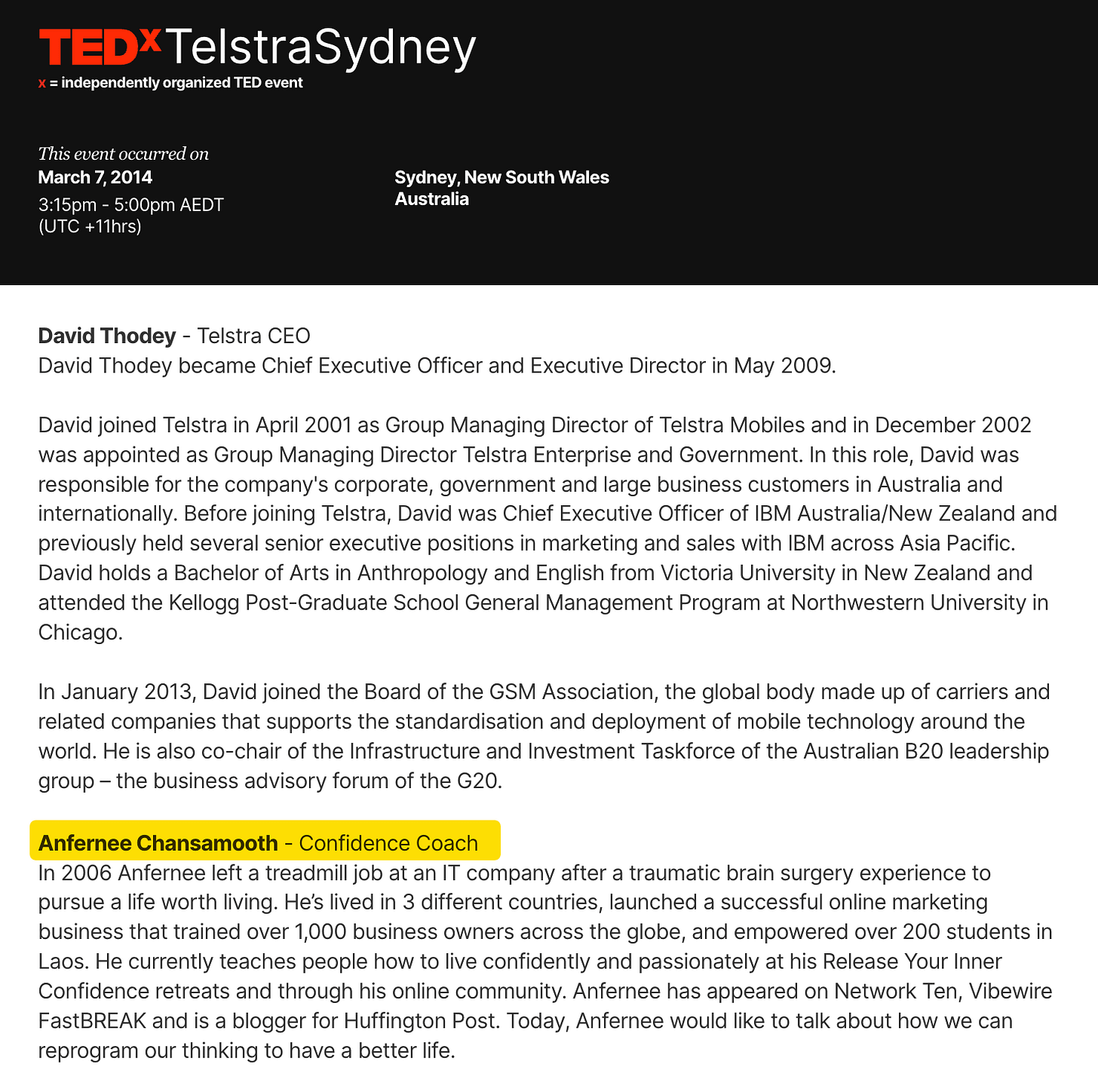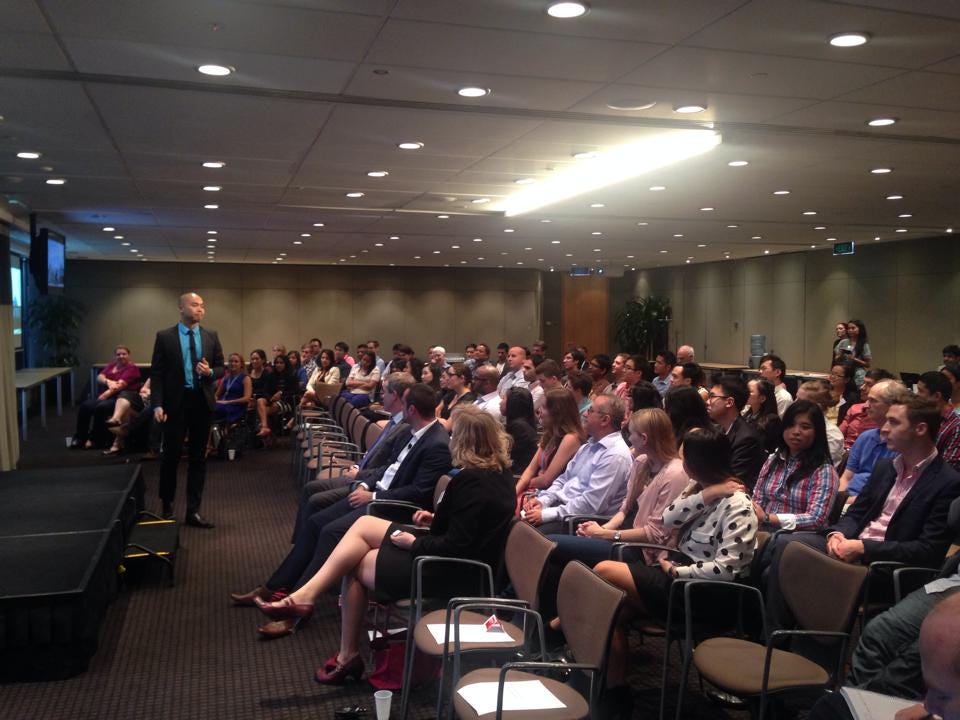How I Landed 2 TEDx Speaking Opportunities
My Journey and Practical Tips for Aspiring Speakers
✏️ ON MY MIND
How I Landed 2 TEDx Speaking Opportunities in Sydney: My Journey and Practical Tips for Aspiring Speakers
In 2013 and 2014, I had the incredible opportunity to speak at two TEDx events. But these didn’t just happen by chance—getting on the TEDx stage took consistent effort, networking, and seizing opportunities. Here’s my story.
My Journey to TEDxSydney Satellite Event at UNE FutureCampus (2013)
In 2012, my former business partner Poy TB and I set out to speak in front of audiences at least once a week. We had a process to identify speaking gigs using Facebook groups, Meetup.com, and a list of coworking spaces where our target audience would likely be.
Our strategy was simple: pitch ourselves to event organisers by highlighting the value we could bring to their audience. That year, we must have spoken at least fifty or more times to different audiences.
In 2013, while volunteering as a social media consultant for the Parramatta Chamber of Commerce, I met Rob Field, the Program Manager for the University of New England (UNE)’s new FutureCampus in Parramatta. Rob invited me to take a tour of UNE’s exciting new building.
After a few conversations, I pitched him the idea of joining forces to host a TEDxSydney Satellite Event with guest speakers at FutureCampus, including Poy and me. Rob loved the idea, and that’s how we ended up speaking at TEDxSydney’s Satellite Event at UNE FutureCampus.
How I ended up speaking at TEDxTelstraSydney (2014)
The following year, Jeffery Wang, founder of the Sydney Professional Development Forum (PDF), invited me to speak at his event. Jeff was working for Telstra at the time.
A few weeks after my PDF talk, Jeff mentioned that Telstra was organising an employee TEDx event. Because he’d seen my presentation topic and skills, he wanted to nominate me as a speaker. He offered to connect me with the event organiser, Tom, and after a coffee meeting, I was officially invited to speak at TEDxTelstraSydney in March 2014.
After my talk, 'How we can reprogram our thinking to have a better life,' former Telstra CEO David Thodey said he enjoyed it. Coming from an esteemed leader with many presentations under his belt, that was a highlight of the event, for sure.
Jeffery, who had helped me secure the gig, gave me this affirming feedback, too:
A note from my experience: Always confirm with organisers if the talks will be shared publicly, especially if getting the video afterwards is one of your goals.
Unfortunately, TEDxTelstraSydney was an internal event for employees only, and although the organisers recorded my talk, it was never shared publicly on TEDx platforms. I knew this beforehand and agreed to speak anyway, as I was doing it for the experience. The team shared some photos with me post-event, so that was cool.
Tips from TEDx Speakers and Organisers
I’ve gathered some fantastic advice from TEDx speakers and organisers, and there’s plenty we can all learn from their experiences.
…
Lynne Testoni (speaker)
A couple of tips:
1/ Just go for it and pitch away. The worst they can say is no! Think of it like pitching a story to an editor - find a strong hook/angle, write a winning paragraph and research the hell out of it to make sure you are bringing something fresh to the conversation.
2/ TEDx talks need a personal angle too, so don’t be afraid to be vulnerable and make that connection between your topic and your personal experience. That will make your pitch and your talk more memorable.
Lynne’s talk: How freelancing can empower the older woman?
T Guthrie (speaker)
For my TEDx talk, someone had let me know that there was an expression of interest open for a topic area I'd be a good fit for, and then I got in touch with the organisers. They'd already closed applications but ended up working something out because it was a good fit content-wise.
So I reckon my main tip would be to be clear in a public-facing way about the topic areas you can speak about so that people tap you on the shoulder :)
Gary Ware (speaker)
My tip is all about networking. Ask mentors or friends who’ve spoken at TEDx events for introductions to organisers. A personal referral from a previous TEDx speaker can significantly boost your credibility.
Gary’s talk: How Play Saved My Life
Saarika Chotai (speaker)
My #1 tip: Don’t assume there are better, more experienced people out there who are more worthy of the opportunity. Or assume there’s no way you’d get picked. Just put your hat in the ring. TEDx has levels, from written applications to pitching, and you can work your way up to the bigger gigs.
Marta A. Nowinska (speaker)
It happened very organically. I was not actually seeking it :) It came to me.
Marta’s talk: The Exchange Economy: Value for Values
Lily Ugbaja (speaker)
Understanding what the local community will resonate with is how I've landed the two opportunities I've pitched to. We see TEDx talks on YouTube and think global, but the most important audience is the live one. The people in that room—what would they care about? You'll get invited to speak once you nail that and can show the organisers why their live audience would care about that topic.
Lily’s talk: Employable: Cracking the code of the new job market
Theo Kapodistrias (speaker and TEDxHobart Director)
The most critical thing for landing a TEDx talk is having an idea that either hasn't been heard before or an idea that is a new take on an existing concept. You want your idea to change audience perceptions—is your idea something that will make audiences feel differently about a particular thing? If so, this is a winning concept and may be appropriate for the TEDx stage.
Theo’s talk: Lessons from my ethnic lunchbox
Carly Faragher (TEDx Coach helping clients land TEDx Talks & former Head of Partnerships at TEDxMelbourne)
Build authentic connections with TEDx speakers and TEDx organisers online and at events. They can offer valuable referrals or insights into upcoming opportunities. Join their mailing lists and be open to online TEDx talk opportunities, which you can secure sooner than in-person events.
How to Identify an Idea Worth Spreading
The core of every TEDx talk is an "idea worth spreading." It’s not just about sharing tips or tactics, you know. You need to present something new, surprising, and challenging.
Here are some tips to help you come up with a winning idea:
Don’t regurgitate the same concepts: A TEDx talk isn’t a typical presentation or a "5 tips to X" talk. Your idea should present something fresh or a new angle on a concept your audience may already know. Challenge the audience’s beliefs and take them on a journey of discovery.
Look for the unexplored: What have you always thought but never seen others express? Is there a standard practice you used to follow in your industry but now question? These unique perspectives are the seeds of a TEDx-worthy idea.
Take the audience on a journey: Your talk should take them from where they are now to where you want them to go. If your idea challenges their beliefs, explain how you arrived at your conclusion and why it matters.
Get personal: The best TEDx talks have a personal angle (watch Jia Jiang’s talk to see what I mean) because the audience can relate to them. Don’t be afraid to connect your topic to your own experiences. Vulnerability and authenticity help forge stronger connections with your audience.
Nail the talk for your local audience: Focus on what will resonate most with the live audience at the local event you’ll be speaking at. Your message may resonate with a global audience, but your first priority is connecting with those in that room.
Make it debatable and defensible: Your idea doesn’t have to be universally agreed upon—TEDx thrives on different perspectives. But make sure you can back up your ideas with research, data, or real-life examples.
Practical Tips for Landing a TEDx Talk
My journey to the TEDx stage came down to consistent effort, networking, and seizing opportunities. Here are a few tips based on my experience and the tips from the other speakers:
1. Build credibility through regular speaking
I got my TEDx opportunities because I was already speaking at events and collecting recommendations. Practice often, and gather feedback from event organisers to boost your credibility. The more you speak, the more confident you’ll become, and the more likely you’ll attract bigger opportunities.
2. Leverage relationships and referrals
Many speakers landed their TEDx talks through networking and referrals. Connect with TEDx organisers, previous speakers, or mentors who can introduce you to the right people. Volunteering, as I did at UNE FutureCampus, is also a great way to get on the organisers' radar and show your value.
Related: The Big Fish networking strategy
3. Create a speaker kit (with video if possible)
A strong speaker kit is essential. Having a portfolio of your public speaking helps organisers see your style in action and increases your chances.
Here’s what my speaker kit contained:
Include video recordings of your talks to strengthen your pitch, and invest in a professional speaker reel to stand out even more.
Here’s a great example of a speaker reel (or “sizzle reel”) video:
(If you’ve yet to see Jia’s talk “What I learned from 100 days of rejection”, it’s one of my faves, and I highly recommend it.)
4. Take action and pitch (even if you don’t feel ready)
Don’t wait until you feel "ready" or assume others are more qualified. Pitch your idea and give it a go. The worst they can say is no, right?
Every pitch refines your message for future opportunities.
5. Present a fresh, compelling idea
Saving the most important tip for last - and it can’t be stated enough which is why I’m repeating it - TEDx talks are all about "ideas worth spreading." Your pitch must offer a unique perspective or a new perspective on an existing concept. Challenge the audience's thinking rather than sharing something generic. This is the key to landing your TEDx talk.
Final Thoughts
Landing a TEDx talk isn’t easy, but it’s definitely achievable with persistence and the right strategies.
From building credibility by speaking regularly to developing a fresh and compelling idea, I hope my journey and the tips shared by other TEDx speakers give you a roadmap for success.
For me, the key takeaway has always been the power of networking and referrals. Both of my TEDx opportunities came from relationships I’d built over time, combined with my commitment to speaking regularly.
Good luck, and get connecting and pitching!
…
PS. If you found this valuable, you’ll probably like my previous newsletter on pitching lessons, too.
👍 PUBLISHED + WORK IN PROGRESS
1/ Social Proof: Part 2 - Case Studies, Awards, Community Validation, and Certifications
2/ Happy International Podcast Day! 🎙️ Here are some of my faves.
🔧 TOOL OF THE WEEK
Scoreapp
The smarter way to generate higher converting leads.
ScoreApp makes quiz funnel marketing easy so that you can attract relevant warm leads, get insightful data and increase your sales.
PS. – Did you get value from this newsletter? If yes, then please:
Forward it to someone else who might find it useful too.
Consider supporting my work and becoming a paid subscriber.







